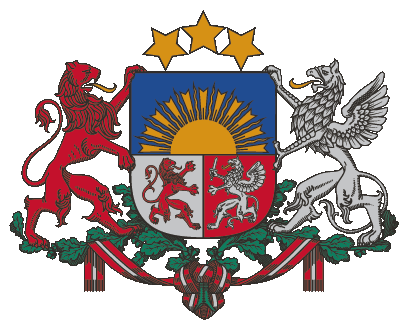
The State Audit Office publishes the audit “How does Alūksne Regional Government work? ”, which assesses whether the regional government has acted lawfully and expediently with financial resources and property, performing its autonomous functions. The audit has concluded that the decisions and actions taken by the regional government were not always founded on the population needs-based targets and were not always traceable and transparent. This is evidenced by the long-term operation without the basic documents of medium-term development planning and the implementation of projects that were not included in them.
BRIEFLY
- When assessing the performance of the regional government as per score system of 100, Alūksne scored 38.
- The regional government based its work planning on the needs of the population identified 10 years ago.
- There are 58% of planned projects implemented. 1/5 of the projects planned for 2021 cannot be found in the Investment Plan.
- The refusal of the Central Finance and Contracting Agency does not detract from the intention to implement an EU project with a significant risk of loss.
- Economic operators have little interest in renting the infrastructure built by the regional government; low return on investment is expected in the implementation of projects.
- Weaknesses in setting remuneration must be addressed and the regulation of the performance evaluation process must be improved.
“Through auditing, we can assist local and regional governments see opportunities to improve their work and help them to do so. This time we performed an audit in the Alūksne Regional Government to draw its attention to the tasks and responsibilities to be performed when planning the regional development and managing financial resources. I believe that the recommendations provided after this audit will also be useful for other local and regional governments in Latvia to improve their work, especially for those new local and regional governments whose work has undergone major and diverse changes in the result of the Administrative and territorial reform,” stated Edgars Korčagins, Member of the Council of the State Audit Office.
- When assessing the performance of the regional government as per score system of 100, Alūksne scored 38
The regional government was informed that the effectiveness of its development planning and organization in the audit would be assessed according to a 100-point score system: effective if it scored above 80 points / ineffective if scored less than 40 points. During the audit (1 January 2019 – 30 June 2020), the auditors assessed the planning and organization of municipal development with 38 points, thus - as ineffective. Here are the evaluation questions and their evaluation criteria:
- Do development-planning documents include solutions to current problems and needs of the population? (scored only 5 points out of 50);
- Can the activity be assessed as effective implementation of the projects specified in the Investment Plan (2015-2021)? (scored 15 out of 30);
- Are the budget financial resources directed to the provision of municipal functions as a priority? (scored 18 out of 20).
Major drawbacks identified by the State Audit Office and recommendations
- The regional government based its work planning on the needs of the population, which were identified 10 years ago
From 2019 to 2021, the regional government had still planned its activities pursuant to the Development Program 2011–2017 based on the needs of the population identified more than a decade ago. Although the program stipulated long-term and medium-term goals for meeting the needs of the community and effective governance, it did not address the issues identified in the population surveys that were relevant to citizens, according to the auditors, such as access to public transport. “Finding out the current needs of the population is essential in the development planning of any local and regional government. Events in recent years have fundamentally changed many aspects of life, and local and regional governments must be as flexible and forward-looking as possible to support the local population and meet their needs, which requires timely and strategic planning,” stressed E.Korčagins.
The audit has concluded that the regional government postponed the elaboration of the development program for four years, including updating the development priorities. The Regional Council approved the Development Program of Alūksne Region (2022–2027) only on 23 December 2021.
- There are 58% of planned projects implemented; 1/5 of the projects planned for 2021 cannot be found in the Investment Plan
It has been established during the audit that the regional government based its development planning only on the Investment Plan, which was updated annually and indicated the projects to be implemented and the deliverables within them. When assessing the implementation of the projects and activities included in the Investment Plan, one concluded that 58% of the planned projects have been implemented, which is 65% of the total funding spent on projects and activities.
The formation of the municipal budget is generally traceable, however, 1/5 of the projects planned in the municipal budget for 2021 for the total amount of 124,289 euros cannot be found in the Investment Plan. As a result, neither the regional population nor the auditors of the State Audit Office can trace the principles according to which the projects not included in the Investment Plan but implemented by the regional government have been selected, for instance, “Ensuring the availability of high-quality engineering infrastructure (airing trail from Ozolu Street to Ezermalas Street along the Alūksne Lake)”.
- The refusal of the Central Finance and Contracting Agency (CFCA) does not detract from the intention to implement an EU project with a significant risk of loss.
The auditors evaluate that the intention of the project “Establishment of Health Promotion Centre” poses a significant risk of damage to the municipal budget, especially as the CFCA has previously decided not to enter into an agreement on the project, citing an overly optimistic assessment of project feasibility that did not correspond to the real situation. However, the regional government did not abandon the intention to implement the project by including it in the new Investment Plan of Alūksne Development Program (2022–2027). If the project, for which the CFCA has already refused to conclude an agreement, will not be implemented in the near future, the financial resources already invested by the regional government of 150,494 euros in the project may have to be written off in loss. “Unlike the principles of the Recovery and Resilience Facility (RRF), where EU Member States will only be funded if they reach the 100% target, funding rules for projects from the EU funds are less strict, namely, the RRF does not allow funding in proportion to performance compared to other EU funds. As a result, not all projects funded by EU funds are truly valuable and sustainable. In several occasions when auditing local and regional governments, we have identified the implementation of projects in a number of local and regional governments where the financial or social and economic return on investment is low or non-existent, although the local or regional government must cover the costs of maintaining the property in any case,” pointed out E.Korčagins.
- Economic operators have little interest in renting the infrastructure built by the regional government; low return on investment is expected in the implementation of projects.
The audit provides an in-depth assessment of six projects implemented by the regional government to support entrepreneurship, for the implementation of which the ERDF funds and the own municipal budget funds have been allocated. In total, more than 7.5 million euros or 44% of 17 million euros spent on projects / activities during the audited period were used. If the situation does not change, financial return is expected to be only less than 1.4 million euros during the life cycle of these projects.
Although the projects were implemented with the aim of promoting business development and increasing the amount of private investment by building suitable infrastructure, the regional government has not succeeded in attracting tenants: in four out of six projects the infrastructure was planned to be leased; however, lease agreements were concluded for the lease of only three sites after the auctions of lease rights arranged. This situation could probably have been remedied by identifying potential tenants already at the project development stage that the legal framework allows and applied by the regional government to only one project. The number of lease bidders was also not boosted by the terms of the lease auction, where potential tenants were given only 10 days to make decisions and participate in the auction. As a result, due to the lack of lease bidders, the maximum potential rent is not be obtained.
The overall benefit of the projects implemented by the regional government is also unclear, as the regional government has initially concluded from the assessment of their cost-effectiveness that the results of the financial performance indicators calculated for all projects were negative. On the other hand, the regional government does not monitor the specified indicators that characterize the actual benefits from the implementation of projects. Currently, the rent paid by economic operators does not even cover the depreciation of the leased sites, which according to the auditors’ estimates will negatively affect the return on the projects implemented by the regional government during their term, that is, investments will not be recovered and there will be overpayment of 308,368 euros for the maintenance of infrastructure built.
- Weaknesses in setting remuneration must be addressed and the regulation of the performance evaluation process must be improved
In the regional government, there has been a different practice in increasing the monthly salary of employees with an equal performance evaluation score. When obtaining the highest performance evaluation score, the monthly salary has been increased only for the employees of the regional government administration and heads of institutions during the audited period, which is about 60 out of 300 employees of the municipal institutions. There is also practice established to increase the monthly salary for one year instead of setting a bonus based on the results of the performance evaluation. The auditors consider that it does not correspond to the essence of the distribution of remuneration, namely, the fixed part is monthly salary, while the variable part is bonuses, premiums, cash prizes.
The Alūksne Regional Government has coordinated the activities to be performed within the framework of 12 provided recommendations and the timeframe for their implementation, setting the deadline for the implementation of the last recommendations as 15 May 2023.
Additional materials
- Audit report
- Recommendation implementation timeframe #AfterAudit
- Hand-book for Local and Regional Governments
Additional information
Ms Signe Znotiņa-Znota
Head of PR and Internal Communication Division
Phone number 67017671 | M. 26440185 | E-mail: signe.znotina-znota@lrvk.gov.lv
